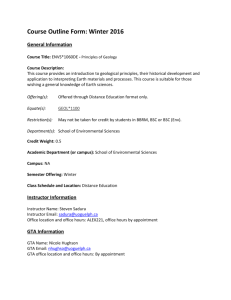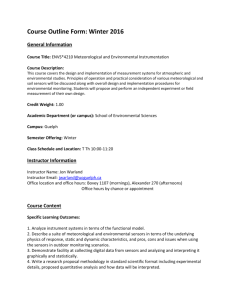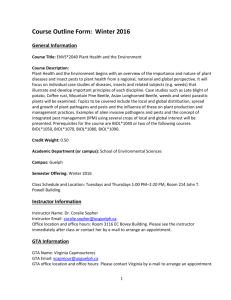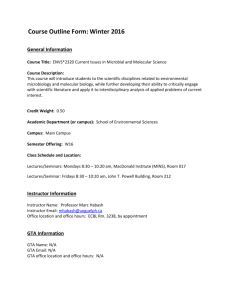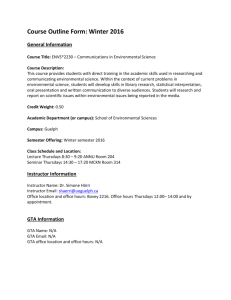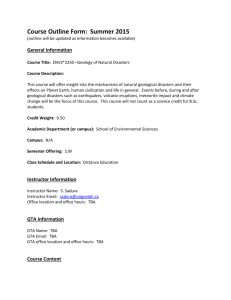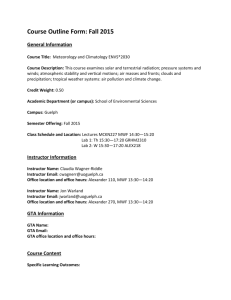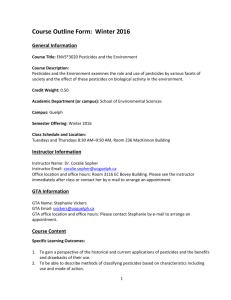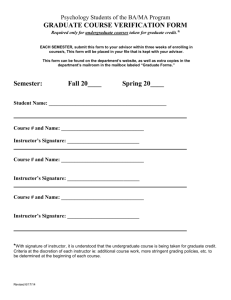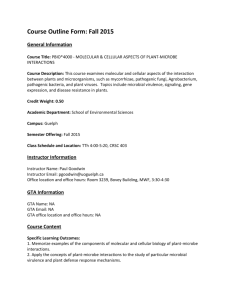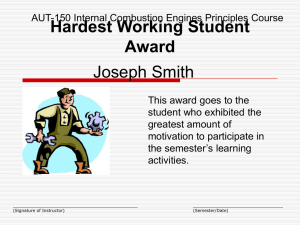ENVS*3010 Climate Change Biology
advertisement
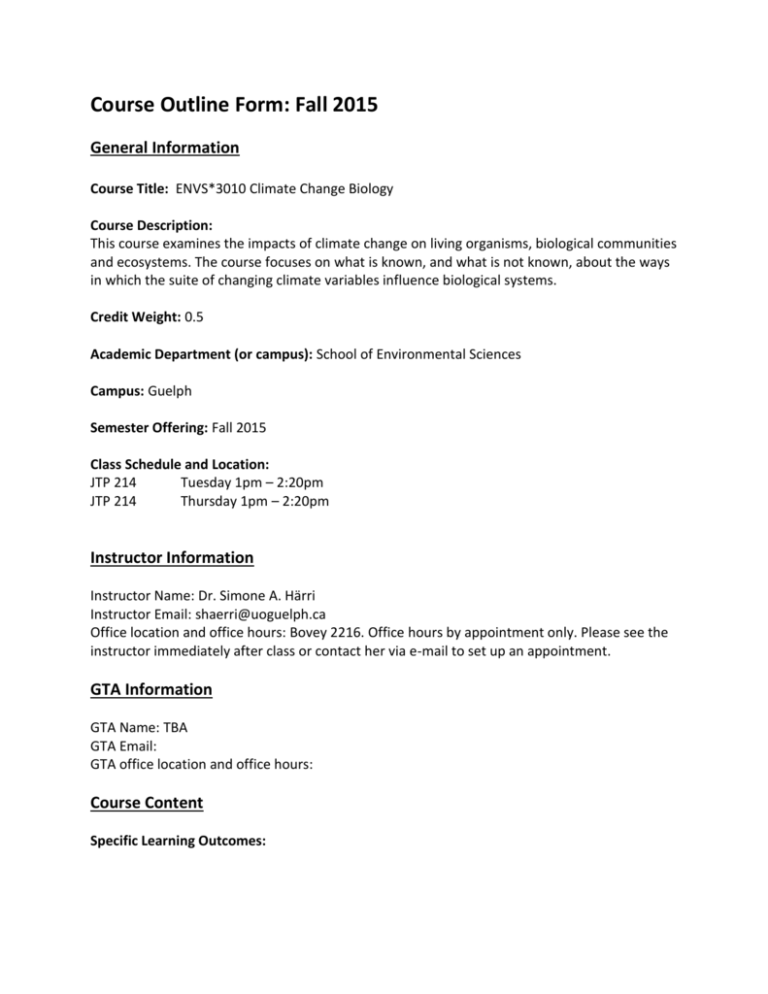
Course Outline Form: Fall 2015 General Information Course Title: ENVS*3010 Climate Change Biology Course Description: This course examines the impacts of climate change on living organisms, biological communities and ecosystems. The course focuses on what is known, and what is not known, about the ways in which the suite of changing climate variables influence biological systems. Credit Weight: 0.5 Academic Department (or campus): School of Environmental Sciences Campus: Guelph Semester Offering: Fall 2015 Class Schedule and Location: JTP 214 Tuesday 1pm – 2:20pm JTP 214 Thursday 1pm – 2:20pm Instructor Information Instructor Name: Dr. Simone A. Härri Instructor Email: shaerri@uoguelph.ca Office location and office hours: Bovey 2216. Office hours by appointment only. Please see the instructor immediately after class or contact her via e-mail to set up an appointment. GTA Information GTA Name: TBA GTA Email: GTA office location and office hours: Course Content Specific Learning Outcomes: 1. Interpret the current climate change in a historical context and define natural and human causes of climate variability 2. Examine the general trends in future climate and interpret the variability in future climate predictions through running different computer models 3. Explain expected changes in the net primary production of ecosystems through the analysis of different effects of climate change on plant physiology and decomposition 4. Hypothesize how different species and entire communities react to the changing climate by formulating a scientific question that will be applied to the design and presentation of a poster 5. Design experimental methods necessary to study how individuals, populations, communities, and entire ecosystems will respond to the changing climate and discuss their limitations Lecture Content: Date Topic Sep 10 Course outline and weather vs. climate Sep 15 Climate variability Sep 17 Climate variability Sep 22 Future climate projection models Sep 24 Climate reconstruction Sep 29 Climate reconstruction Oct 1 Future climate projections Oct 6 Physiological changes to climate change Oct 8 Physiological changes to climate change Oct 13 NO CLASSES Oct 15 MIDTERM Oct 20 Population responses to climate change Oct 22 Population responses to climate change Oct 27 Community responses to climate change Oct 29 Community responses to climate change Nov 3 Ecosystem responses to climate change Nov 5 Ecosystem responses to climate change Nov 10 POSTER SESSION Nov 12 POSTER SESSION Nov 17 Evolutionary responses to climate change Nov 19 Effects of climate change on biodiversity Nov 24 Effects of climate change on agriculture Nov 26 Effects of climate change on forest productivity Dec 1 Review Dec 3 Review Labs: N/A Seminars: N/A Course Assignments and Tests: Assignment or Test Due Date Online quizzes September 20 & 27, October 4, 11 & 25, November 1, 8, 22 & 29 December 6 First submission: September 28, 2015 Second submission: October 5, 2015 October 15, 2015 Submission to Dropbox: November 9, 2015 Presentations: November 10 or 12, 2015 November 30, 2015 December 14, 2015 Future projections Midterm (in class) Poster presentation Method piece Final exam Contribution to Final Mark (%) 20% Learning Outcomes Assessed 1, 3, 4, 5 15% 2 10% 20% 1, 2, 3 2, 3, 4 15% 20% 3, 4, 5 1, 2, 3, 5 Dropbox and quiz submission time is before 23:59 the day of the due date. Additional Notes (if required): You get two attempts for each online quiz and the attempt with the higher mark counts towards your final grade. The lowest quiz mark will be dropped at the end of the semester. The first submission of the future projection assignment counts 65% towards the assignment grade and the second submission contributes 35%. You can only submit a second time, if you submitted a first version. If you don’t submit a second version, your first submission contributes 100% towards the assignment grade. The midterm follows a two-stage procedure with an individual and a group part. The individual part of the midterm is worth 85% of your grade, the group part counts 15%. Final examination date and time: December 14, 2015. 11:30 – 13:30 Final exam weighting: 20% Course Resources Required Texts: Climate Change Biology (2011) Jonathan A. Newman, Madhur Anand, Hugh A.L. Henry, Shelley Hunt and Ze’ev Gedalof. Held at the library reserve desk. Recommended Texts: N/A Lab Manual: N/A Other Resources: D2L: The instructor uses CourseLink for posting class announcements, hand-outs, slides from lectures, class readings, weekly quizzes, grades and other required and recommended materials that is relevant to this course. Please check this site often. Socrative: This class will use Socrative as an in-class assessment tool to provide instant feedback for the students and the instructor. You can access it online at m.socrative.com or obtain it as a free app for Iphone or android phones. Field Trips: N/A Additional Costs: You will have to cover the cost for printing your posters. The posters will cost a maximum of 30$. The costs of the posters will be shared among group members. Group size will be 5 – 6 students. Course Policies Grading Policies: Assignments are to be submitted online via D2L before midnight on the due date. Assignments handed-in late, for which an extension has not been granted ahead of time, will lose 10% of the total marks for every day (or part thereof) that it is late. If you require an extension on an assignment, you must have a valid reason and contact Dr. Härri in advance of the due date. Course Policy on Group Work: This course encourages group work and collaborative problem solving. The second stage of the midterm and the poster presentation require group work to complete the assessment. The future projections and the method piece should be written entirely by the student alone, should reflect the opinion of the student alone and should be the original work of the student. For group assignments, the completed assignment should contain only work which has been produced by members of the group in question. There will be a peer evaluation system for the poster presentations using the PEAR tool. Course Policy regarding use of electronic devices and recording of lectures: Electronic recording of classes is expressly forbidden without consent of the instructor. When recordings are permitted they are solely for the use of the authorized student and may not be reproduced, or transmitted to others, without the express written consent of the instructor. University Policies Academic Consideration: The University of Guelph is committed to supporting students in their learning experiences and responding to their individual needs and is aware that a variety of situations or events beyond the student's control may affect academic performance. Support is provided to accommodate academic needs in the face of personal difficulties or unforeseen events in the form of Academic Consideration. Information on regulations and procedures for Academic Consideration, Appeals and Petitions, including categories, grounds, timelines and appeals can be found in Section VIII (Undergraduate Degree Regulations and Procedures) of the Undergraduate Calendar. Academic Misconduct: The University of Guelph is committed to upholding the highest standards of academic integrity and it is the responsibility of all members of the University community, faculty, staff, and students to be aware of what constitutes academic misconduct and to do as much as possible to prevent academic offences from occurring. University of Guelph students have the responsibility of abiding by the University's policy on academic misconduct regardless of their location of study; faculty, staff and students have the responsibility of supporting an environment that discourages misconduct. Students need to remain aware that instructors have access to and the right to use electronic and other means of detection. Please note: Whether or not a student intended to commit academic misconduct is not relevant for a finding of guilt. Hurried or careless submission of assignments does not excuse students from responsibility for verifying the academic integrity of their work before submitting it. Students who are in any doubt as to whether an action on their part could be construed as an academic offence should consult with a faculty member or faculty advisor. Detailed information regarding the Academic Misconduct policy is available in Section VIII (Undergraduate Degree Regulations and Procedures) of the Undergraduate Calendar. Accessibility: The University of Guelph is committed to creating a barrier-free environment. Providing services for students is a shared responsibility among students, faculty and administrators. This relationship is based on respect of individual rights, the dignity of the individual and the University community's shared commitment to an open and supportive learning environment. Students requiring service or accommodation, whether due to an identified, ongoing disability or a short-term disability should contact the Student Accessibility Services (SAS), formerly Centre for Students with Disabilities (CSD), as soon as possible. For more information, contact SAS at 519-824-4120 ext. 56208 or email sas@uoguelph.ca or visit the Student Accessibility Services website (http://www.uoguelph.ca/csd/). Course Evaluation Information: End of semester course and instructor evaluations provide students the opportunity to have their comments and opinions used as an important component in the Faculty Tenure and Promotion process, and as valuable feedback to help instructors enhance the quality of their teaching effectiveness and course delivery. While many course evaluations are conducted in class others are now conducted online. Please refer to the Course and Instructor Evaluation Website for more information. Drop period: The drop period for single semester courses starts at the beginning of the add period and extends to the Fortieth (40th) class day of the current semester (the last date to drop a single semester courses without academic penalty) which is listed in Section III (Schedule of Dates) of the Undergraduate Calendar. The drop period for two semester courses starts at the beginning of the add period in the first semester and extends to the last day of the add period in the second semester. Information about Dropping Courses can be found in Section VIII (Undergraduate Degree Regulations and Procedures) of the Undergraduate Calendar.
